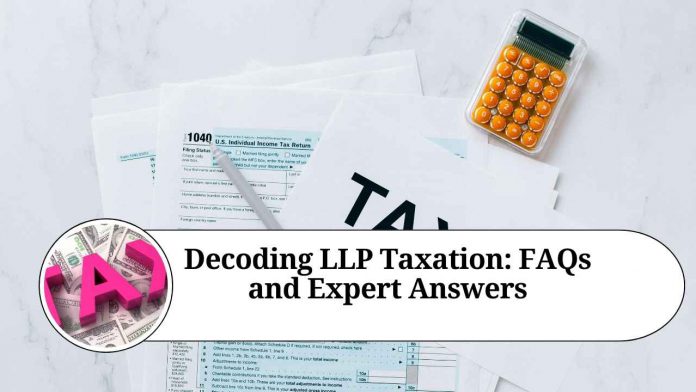Understanding the Taxation System of LLPs
LLPs are taxed as separate entities from their partners. This means that the LLP itself is responsible for paying taxes on its income, while the partners are responsible for paying taxes on their share of the LLP’s income. LLPs are required to file their tax returns annually, disclosing all income earned and expenses incurred during the financial year. The LLP tax rate is calculated based on the total income earned by the LLP during the financial year.
LLP Tax Rates
LLP tax rates are the same as the tax rates for regular companies in India. The current tax rate for LLPs is 30% for income up to INR 50 lakhs, 33% for income between INR 50 lakhs to INR 1 crore, and 34% for income above INR 1 crore. In addition to income tax, LLPs are also subject to other taxes such as GST, TDS, and other indirect taxes, depending on their business activities.
Taxation of LLP Partners
As mentioned earlier, LLP partners are taxed on their share of the LLP’s income. The tax rate applicable to the partners depends on their income slab and the type of income earned (i.e., salary, profit share, etc.). LLP partners are required to file their income tax returns annually, disclosing their share of the LLP’s income, deductions, and other relevant details.
Tax Planning for LLPs
Like any other business, LLPs can also plan their taxes to minimize their tax liability legally. LLPs can explore various tax-saving opportunities, such as deductions and exemptions available under the Income Tax Act, of 1961. It is always advisable to consult a tax expert or a chartered accountant for effective tax planning.
Apart from the regular taxes, LLPs are also subject to tax deducted at source (TDS) on certain transactions, such as salaries, rent, and professional fees. The LLPs are required to deduct TDS at the applicable rates and deposit the same with the government. LLPs are also required to file TDS returns and issue TDS certificates to the payees.
Conclusion
LLPs are subject to various taxes, such as income tax, GST, and TDS. LLPs must comply with the tax laws and file their tax returns accurately and on time to avoid interest, penalties, or other legal consequences. Effective tax planning can help LLPs minimize their tax liability and optimize their profits. It is advisable to consult a tax expert or a chartered accountant for tax planning and compliance.
Other Related Blogs: Section 144B Income Tax Act
FAQs on LLP Tax Rate:
Q: What is the current LLP tax rate in India?
A: The current LLP tax rate in India is 30% for income up to INR 50 lakhs, 33% for income between INR 50 lakhs to INR 1 crore, and 34% for income above INR 1 crore.
Q: Are LLPs required to pay GST?
A: Yes, LLPs are required to pay GST if their annual turnover exceeds the threshold limit of INR 20 lakhs (INR 10 lakhs for Northeastern and Hill States).
Q: Are LLP partners subject to income tax?
A: Yes, LLP partners are subject to income tax on their share of the LLP’s income.
Q: What is the tax rate applicable to LLP partners?
A: The tax rate applicable to LLP partners depends on their income slab and the type of income earned (i.e., salary, profit share, etc.).
Q: Are LLPs subject to tax deducted at source (TDS)?
A: Yes, LLPs are subject to TDS on certain transactions such as salaries, rent, and professional fees.
Q: Can LLPs claim deductions for tax-saving investments?
A: Yes, LLPs can claim deductions for tax-saving investments such as investments in mutual funds, health insurance premiums, and home loan interest payments.
Q: Is it advisable to consult a tax expert for LLP tax planning?
A: Yes, it is always advisable to consult a tax expert or a chartered accountant for effective tax planning and compliance with tax laws.




















